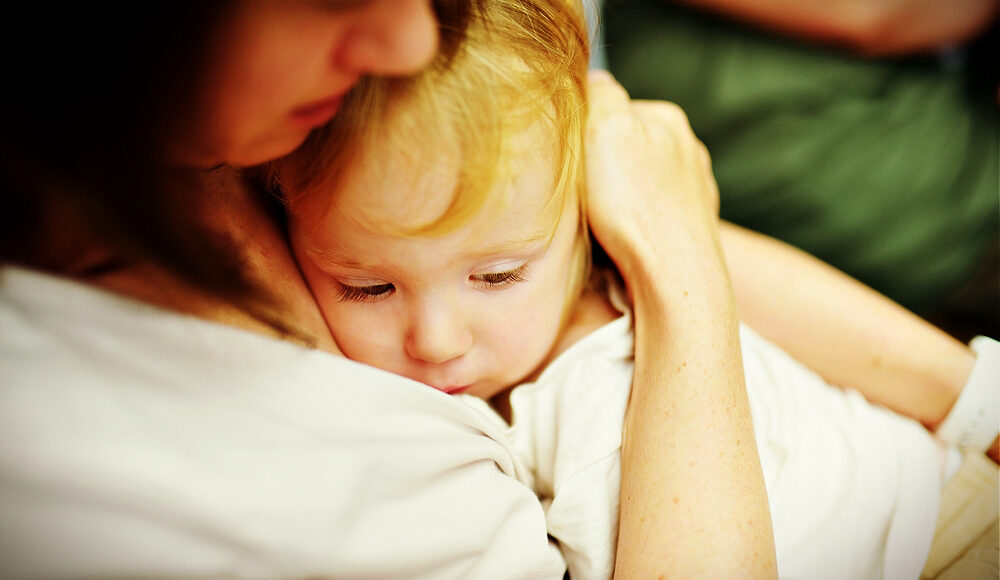How A Wellness-Informed Worldview Supports Trauma-Informed Insights: An Update On ACES and Attachment in Scotland
Suzanne Zeedyk, PhD, shares her new paper and an update on ACES and Attachment in Scotland
Attachment-promoting work is very important for westernized societies where people have typically been encouraged by western philosophy, institutions, and practices to see themselves as separate beings rather than entangled in the wellbeing of others. Attachment science emphasizes responsive connection, rather than detachment, which of course is fundamental to human wellbeing, especially so for young children.
Suzanne Zeedyk and other educators in Scotland worked for years to get the word out there and finally it took off. It’s wonderful (ethical!) when a government educates and funds wellbeing in its people as the Scots are doing. – Darcia Narvaez, PhD, Kindred World, President, and Evolved Nest Initiative, Founder
How A Wellness-Informed Worldview Supports Trauma-Informed Insights: An Update On ACES And Attachment In Scotland
This post is a follow-up to Suzanne Zeedyk’s video presentation on ACES and Attachment Awareness in Scotland to the Kindred Fellowship Program, KFP, in June 2022 and Kindred’s feature with her in 2020. A summary of the same themes and insights from her KFP video presentation appear in a paper Suzanne disseminated to the public this fall, in collaboration with her colleague Simon Partridge. First published in a professional journal in 2021, the paper is entitled “The Sciences of ACES and Attachment: Their Shared History in Scotland”. You can download the paper here, and read the overview and watch her video presentation below.
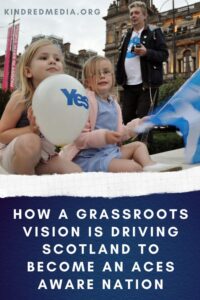 Why are Suzanne’s insights important to the emerging global wellness and trauma-informed movements? Because her work shows that when a relational approach (based in attachment science) exists as a cultural frame for trauma-informed insights (ACES), cultural transformation possibilities are very real. In contrast, in cultures that are not relationally–informed, such as the United States, reactions to ACES’ trauma-informed science operate without the context/worldview needed to lead us toward wellbeing and wholeness.
Why are Suzanne’s insights important to the emerging global wellness and trauma-informed movements? Because her work shows that when a relational approach (based in attachment science) exists as a cultural frame for trauma-informed insights (ACES), cultural transformation possibilities are very real. In contrast, in cultures that are not relationally–informed, such as the United States, reactions to ACES’ trauma-informed science operate without the context/worldview needed to lead us toward wellbeing and wholeness.
Because Americans do not experience a wisdom-based, wellness-informed society, it may be difficult for many of us to imagine how basic social supports through public policy creation could impact the country’s current devolution into a more authoritarian society. How we raise children is how children will treat the world, and right now, our cultural cycle of disconnection appearing as transgenerational trauma is thriving, not our children. Currently, he US ranks at the bottom of all developed nations indices for maternal, child, and family wellness, a trend that has continued downward for the past fifty years. Kindred World was founded in the middle of this trend. (Read about our history of family wellness advocacy here.)
At Kindred, Darcia Narvaez is reframing the discussion around wellness-informed and trauma-informed with her award-winning research on our Evolved Nest. Our Evolved Nest expands on the original insights of attachment science, broadening the focus on the parent to the community, says Narvaez. “Attachment, feeling bonded to a caregiver, is only one thread in the cloak of what a child needs for healthy (species-typical) growth. Caregiver responsiveness, which is associated with secure attachment, is only one of the nine components of the Evolved Nest. There are eight (at least) other experiences that the child needs as well,” said Narvaez for this editorial. “Trauma, emotional scars from distressing social experiences, was rare in our ancestral context as the evolved nest was routinely provided throughout life.”
Reflecting this narrow focus on parents is the US Centers for Disease Control and Prevention’s video We Can Prevent ACES. The public service announcement video focuses on individualized recommendations like parent education, a microcosmic approach that faults parents instead of considering the macrocosm: a culture missing wellness-informed social supports like universal healthcare, childcare, maternal care, breastfeeding support, and paid family leave enjoyed by every developed country in the world.
America’s lack of a wisdom-based, wellness-informed worldview means the trauma-informed movement encounters a medical model dominated system ready to pathologize and potentially opt for drugs for children. This does not mean the welcome and incredible work of our partners, like PACES, is in vain. It means trauma-informed activists in the US, without a relational worldview built on attachment and our evolved nest, have a steeper mountain to climb.
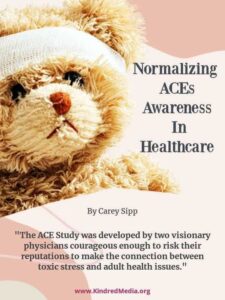 “We have a much steeper hill to climb, because not only do we come to this at a deficit, but we come at this issue from a place of harm, especially to people in under-served communities, making it incredibly difficult for them to work, find safe, stable, nurturing childcare, find affordable housing that is safe and stable, manage healthcare, and then try to bond with their precious newborn when there is no national paid family leave policy,” said Carey Sipp, Director of Strategic Partnerships at PACES Connection said in a phone interview for this editorial.
“We have a much steeper hill to climb, because not only do we come to this at a deficit, but we come at this issue from a place of harm, especially to people in under-served communities, making it incredibly difficult for them to work, find safe, stable, nurturing childcare, find affordable housing that is safe and stable, manage healthcare, and then try to bond with their precious newborn when there is no national paid family leave policy,” said Carey Sipp, Director of Strategic Partnerships at PACES Connection said in a phone interview for this editorial.
“Trauma-informed practices help sensitize professionals to the wounds of their clientele (students, patients, workers). They can then set up practices and individualized treatments that avoid triggering traumatic memory and behavior. Sometimes support for positive growth is also provided,” says Narvaez. “The wellness-informed pathway is a much broader framework than trauma-informed practice. The wellness-informed pathway, based in transdisciplinary science, is attentive to what members of our species require for healthy development and healthy living. When communities provision the evolved nest fully, trauma is largely avoided. Wellness-informed practices start with providing for basic needs through the evolved nest.”
Kindred’s history in following the work of Suzanne Zeedyk is a long one. In our first interview over a decade ago, Suzanne described how Scottish police departments were becoming attachment informed and how this shift in worldview contributed to profound changes in their approach to the communities and families they served. You can hear my first interview with Suzanne in 2011 here, but more remarkably, you can watch Suzanne discussing attachment science in 2009 with the Scottish Violence Reduction Unit here.
“Attachment-promoting work is very important for westernized societies where people have typically been encouraged by western philosophy, institutions, and practices to see themselves as separate beings rather than entangled in the wellbeing of others. Attachment science emphasizes responsive connection, rather than detachment, which of course is fundamental to human wellbeing, especially so for young children. Suzanne Zeedyk and other educators in Scotland worked for years to get the word out there and finally it took off. It’s wonderful (ethical!) when a government educates and funds wellbeing in its people as the Scots are doing,” shared Narvaez.
It has been and will be Kindred’s vision-holding mission to bring forward, in the US and globally, the educational and support resources that parents, professionals, and communities need to become aware of and shift our worldviews, our meta-cognitive capacities. Check out a few resources below for where to learn more, and read Suzanne Zeedyk’s fascinating account of how Scotland became an attachment-aware nation.
RESOURCES
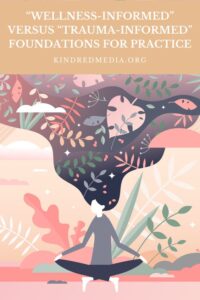 Please enjoy these resources and share them widely:
Please enjoy these resources and share them widely:
Read Suzanne and Simon’s new paper, “The Sciences of ACES and Attachment: Their Shared History in Scotland” here.
Watch Suzanne present the History of ACES and Attachment in Scotland to the Kindred Fellowship Program from the summer of 2022 here and below.
Listen to Kindred’s podcast interview and read the transcript with Suzanne, How A Grassroots Vision Is Driving Scotland To Become An ACES Aware Nation from 2020 here.
Watch Suzanne’s interviews with Scottish police officers discussing the Origins of the Scottish Violence Reduction Unit in 2009 in this video here.
Watch the trailer for Suzanne’s classic film, The Connected Baby, here.
Learn more about the large events that ACE Aware Scotland have hosted annually since 2018 on their website https://aceawarescotland.com, and watch any of the 100 videos on their YouTube Channel to get a good sense of how those events feel here.
Visit the PACES Connection website for more US information on the trauma-informed movement here.
Read Kindred’s posts on becoming Wellness-Informed by Darcia Narvaez, PhD, here.
The Sciences of ACEs and Attachment:
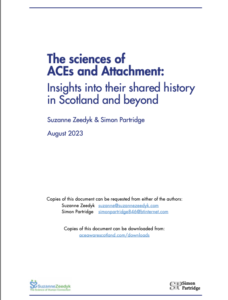 Insights into their shared history in Scotland and beyond
Insights into their shared history in Scotland and beyond
By Suzanne Zeedyk and Simon Partridge
Published August 2023
Download the paper here: https://aceawarescotland.com/downloads/
Overview
Why does a society need to focus on ensuring children have warm, attentive relationships with adults? Why is that crucial for healthy emotional development? These are the questions Simon Partridge and Suzanne Zeedyk addressed in a set of papers they published in 2021. Because the articles appeared in an academic journal, many members of the public missed their publication. This document was created in 2023 in order to help a wider audience share in discussions about the links between the sciences of ACEs and attachment.
The paper by Suzanne Zeedyk tells the story of Scotland’s ACEs movement, which began in 2005 and burgeoned unexpectedly in 2017. Her central point is that this movement is grounded in an emphasis on the importance of relationships. The paper by Simon Partridge, written as an editorial, traces previously unrealised links between attachment theory, led by Dr John Bowlby starting in the 1930s, and the more recent science of Adverse Childhood Experiences (ACEs), which emerged in the 1990s. Partridge’s discovery is that the same terminology has been used by both. Recognising this history helps when thinking about how the insights from these two areas can be put into practical use.
This document provides insights into the ways in which organisations and individuals throughout Scotland and beyond are striving to put relationships at the centre of their practice and policy. It is hoped the story will be of value not only to Scottish citizens, but to anyone seeking inspiration from a story of unfolding cultural change.
The document contains content from the following three articles and relevant photographic illustrations.
Conclusion
Our country faces many challenges. We are a long way from being an ACE-aware nation, where all five million of our citizens fully appreciate that the way children are treated leaves a biological impact on the way they develop. It is still too easy to create divisive narratives of exclusion, with trauma constructed as something that happens to ‘other people over there’, rather than something that unites us as human beings. Too many people continue to feel – and to be – unheard, isolated, excluded. The Covid pandemic will have increased the frequency of ACEs. This information is needed now more than ever.
That is why the determined sense of hope within the Scottish movement is cherished. In her keynote speech at the ACE Aware Nation conference, McCluskey (2018) reflected on the many hills that had to be climbed after she and Carnochan first suggested that loving babies could help to cut crime. She quoted the words of philosopher Adam Smith, who shaped Scotland’s Enlightenment of the 18th century. “No society can surely be flourishing and happy, of which the greater part of the members are poor and miserable.” She described this era as a new Enlightenment, predicting that “in ten years’ time, people will hold Scotland up and say, ‘Look what they did.’”
It is, though, the reflection provided by mental health specialist Brodie Paterson (2021) that perhaps provides the most poetic account of the Scottish movement’s success:
“The philosopher Foucault suggests we should think of history as a series of happenings, sometimes quick, sometimes slow, sometimes happening over generations. Particular combinations of events create the conditions of possibility without which future events cannot happen. This is, I think, the ACEs movement in Scotland. Our mental health team knew about the ACE Study from very early on, but despite considerable effort, could gain no traction in mainstreaming the issues. It took the development of an ACE community to do that.”
ACEs has given Scotland a shared language for talking not only about the distress of trauma, but also about the power of relationships.
Watch Suzanne’s ACES and Attachment Kindred Presentation


